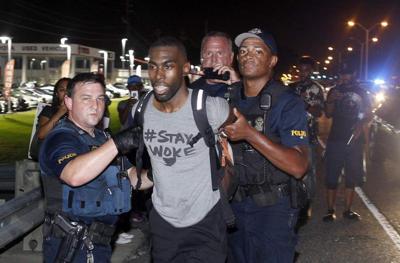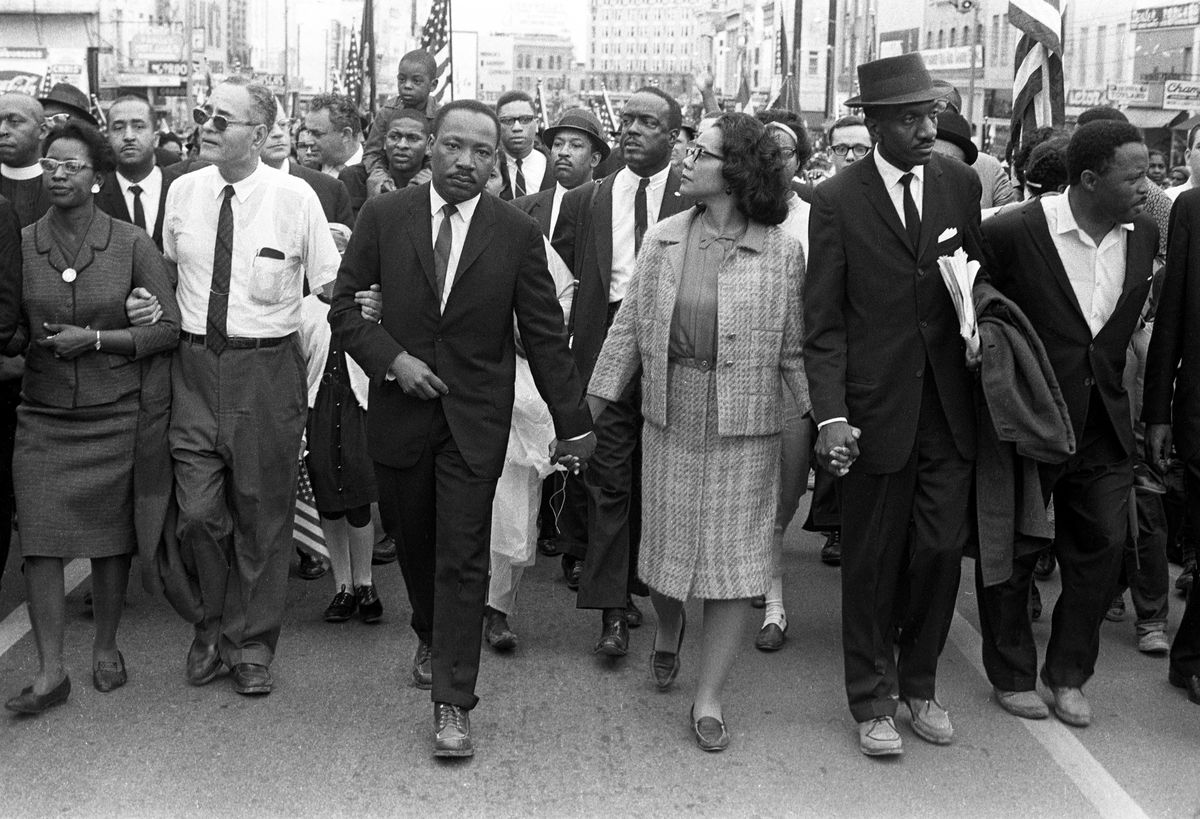The Supreme Court effectively abolishes the right to mass protest in three US states
It is no longer safe to organize a protest in Louisiana, Mississippi, or Texas.

Police arrest activist DeRay McKesson on July 9, 2016 during a protest over the fatal shooting of Alton Sterling by two white Baton Rouge police officers
The Supreme Court announced on Monday that it will not hear Mckesson v. Doe. The decision not to hear Mckesson leaves in place a lower court decision that effectively eliminated the right to organize a mass protest in the states of Louisiana, Mississippi, and Texas.
Under that lower court decision, a protest organizer faces potentially ruinous financial consequences if a single attendee at a mass protest commits an illegal act.
It is possible that this outcome will be temporary. The Court did not embrace the United States Court of Appeals for the Fifth Circuit’s decision attacking the First Amendment right to protest, but it did not reverse it either. That means that, at least for now, the Fifth Circuit’s decision is the law in much of the American South.
For the past several years, the Fifth Circuit has engaged in a crusade against DeRay Mckesson, a prominent figure within the Black Lives Matter movement who organized a protest near a Baton Rouge police station in 2016.
The facts of the Mckesson case are, unfortunately, quite tragic. Mckesson helped organize the Baton Rouge protest following the fatal police shooting of Alton Sterling. During that protest, an unknown individual threw a rock or similar object at a police officer, the plaintiff in the Mckesson case who is identified only as “Officer John Doe.” Sadly, the officer was struck in the face and, according to one court, suffered “injuries to his teeth, jaw, brain, and head.”
Everyone agrees that this rock was not thrown by Mckesson, however. And the Supreme Court held in NAACP v. Claiborne Hardware (1982) that protest leaders cannot be held liable for the violent actions of a protest participant, absent unusual circumstances that are not present in the Mckesson case — such as if Mckesson had “authorized, directed, or ratified” the decision to throw the rock.
Indeed, as Justice Sonia Sotomayor points out in a brief opinion accompanying the Court’s decision not to hear Mckesson, the Court recently reaffirmed the strong First Amendment protections enjoyed by people like Mckesson in Counterman v. Colorado (2023). That decision held that the First Amendment “precludes punishment” for inciting violent action “unless the speaker’s words were ‘intended’ (not just likely) to produce imminent disorder.”
The reason Claiborne protects protest organizers should be obvious. No one who organizes a mass event attended by thousands of people can possibly control the actions of all those attendees, regardless of whether the event is a political protest, a music concert, or the Super Bowl. So, if protest organizers can be sanctioned for the illegal action of any protest attendee, no one in their right mind would ever organize a political protest again.
Indeed, as Fifth Circuit Judge Don Willett, who dissented from his court’s Mckesson decision, warned in one of his dissents, his court’s decision would make protest organizers liable for “the unlawful acts of counter-protesters and agitators.” So, under the Fifth Circuit’s rule, a Ku Klux Klansman could sabotage the Black Lives Matter movement simply by showing up at its protests and throwing stones.
The Fifth Circuit’s Mckesson decision is obviously wrong
Like Mckesson, Claiborne involved a racial justice protest that included some violent participants. In the mid-1960s, the NAACP launched a boycott of white merchants in Claiborne County, Mississippi. At least according to the state supreme court, some participants in this boycott “engaged in acts of physical force and violence against the persons and property of certain customers and prospective customers” of these white businesses.
Indeed, one of the organizers of this boycott did far more to encourage violence than Mckesson is accused of in his case. Charles Evers, a local NAACP leader, allegedly said in a speech to boycott supporters that “if we catch any of you going in any of them racist stores, we’re gonna break your damn neck.”
But the Supreme Court held that this “emotionally charged rhetoric ... did not transcend the bounds of protected speech.” It ruled that courts must use “extreme care” before imposing liability on a political figure of any kind. And it held that a protest leader may only be held liable for a protest participant’s actions in very limited circumstances:
There are three separate theories that might justify holding Evers liable for the unlawful conduct of others. First, a finding that he authorized, directed, or ratified specific tortious activity would justify holding him responsible for the consequences of that activity. Second, a finding that his public speeches were likely to incite lawless action could justify holding him liable for unlawful conduct that in fact followed within a reasonable period. Third, the speeches might be taken as evidence that Evers gave other specific instructions to carry out violent acts or threats.
The Fifth Circuit conceded, in a 2019 opinion, that Officer Doe “has not pled facts that would allow a jury to conclude that Mckesson colluded with the unknown assailant to attack Officer Doe, knew of the attack and ratified it, or agreed with other named persons that attacking the police was one of the goals of the demonstration.” So that should have been the end of the case.
Instead, in its most recent opinion in this case, the Fifth Circuit concluded that Claiborne’s “three separate theories that might justify” holding a protest leader liable are a non-exhaustive list, and that the MAGA-infused court is allowed to create new exceptions to the First Amendment. It then ruled that the First Amendment does not apply “where a defendant creates unreasonably dangerous conditions, and where his creation of those conditions causes a plaintiff to sustain injuries.”
And what, exactly, were the “unreasonably dangerous conditions” created by the Mckesson-led protest in Baton Rouge? The Fifth Circuit faulted Mckesson for organizing “the protest to begin in front of the police station, obstructing access to the building,” for failing to “dissuade” protesters who allegedly stole water bottles from a grocery store, and for leading “the assembled protest onto a public highway, in violation of Louisiana criminal law.”
Needless to say, the idea that the First Amendment recedes the moment a mass protest violates a traffic law is quite novel. And it is impossible to reconcile with pretty much the entire history of mass civil rights protests in the United States.

Dr. Martin Luther King Jr. leads marchers in what the Fifth Circuit calls an “unreasonably dangerous” activity.
In fairness, the Court’s decision to leave the Fifth Circuit’s attack on the First Amendment in place could be temporary. As Sotomayor writes in her Mckesson opinion, when the Court announces that it will not hear a particular case it “expresses no view about the merits.” The Court could still restore the First Amendment right to protest in Louisiana, Mississippi, and Texas in a future case.
For the time being, however, the Fifth Circuit’s Mckesson decision remains good law in those three states. And that means that anyone who organizes a political protest within the Fifth Circuit risks catastrophic financial liability.
No comments:
Post a Comment